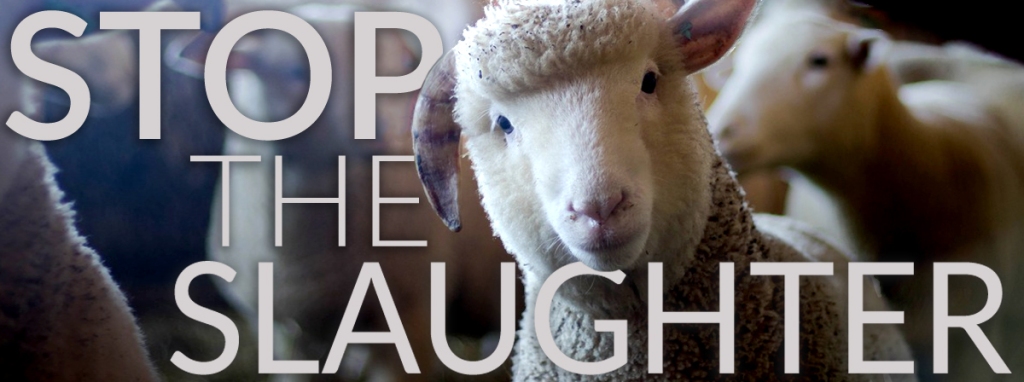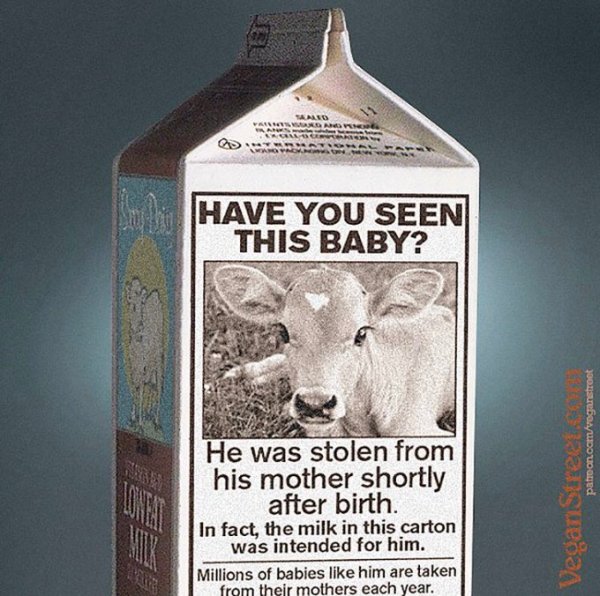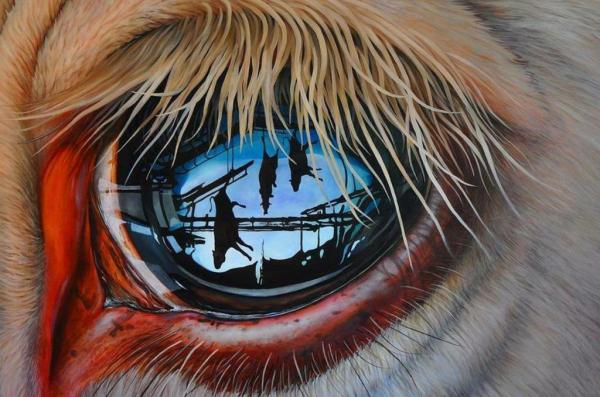3.4 Million “Live Inventory” – Chickens and Turkeys – Drowned or Starved to Death in North Carolina Storm

Chicken farm buildings inundated with floodwater from Hurricane Florence near Trenton, N.C., Sunday, Sept. 16, 2018. (AP Photo/Steve Helber)
Source Animals 24/7
By Karen Davis, PhD, President of United Poultry Concerns
Afterword by Merritt Clifton, Animals 24/7
A caring person’s reaction to learning that millions of chickens and turkeys and pigs drowned in North Carolina this month is the gut-wrench of sorrow and pity for these helpless souls and outrage at the companies that didn’t see fit to protect their captives from the hurricane they knew was coming.
But just as farmed animal businesses are indifferent when a fire burns and suffocates to death millions of chickens and other animals trapped in cages, crates, and confinement sheds, so they are indifferent when, instead of flames, the disaster occurs in the form of floods.
The North Carolina Department of Agriculture and Consumer Services reported last week that 3.4 million chickens and turkeys and 5,500 pigs died in Hurricane Florence. The company most cited was Sanderson Farms who told journalists that 1.7 million of its 20 million chickens drowned or starved to death in the sheds when the company couldn’t get food to them.
Pleased to report that none of its personnel appear to have died in the storm, Sanderson Farms noted, by contrast, that its “live inventories” were not so lucky, and that its focus now is on “replenishing our live production inventories.”
Companies like Sanderson needn’t worry. Between insurance payouts and the U.S. Department of Agriculture’s indemnification program, agribusinesses can comfortably repair and rebuild their flood-or-fire-damaged buildings and quickly restock millions of new individuals, the same as they always do whenever weather or diseases such as avian influenza devastate their “inventory.”
Does anyone think that companies permitted by the U.S. Department of Agriculture to suffocate millions of chickens and turkeys to death in rolling tides of fire-fighting foam as a means of mass extermination – does anyone think these companies care about the animals? An article in Poultry World on September 20th exemplifies what matters to them: North Carolina-based Butterball, the largest turkey producer in the U.S., assured everyone that the storm’s impact “would not lead to any pre-Thanksgiving turkey shortage.”
While businesses that “own” animals have an obligation to protect them against foreseeable disasters, the unfixable problem is that the entire life of the majority of animals in food production is so miserable that just about anything that ends their life sooner than later may be viewed as preferable to being “saved.” Saved for what? The experience of chickens and turkeys, in the words of veterinary scientist John Webster, is, he said, “in both magnitude and severity, the single most severe, systematic example of man’s inhumanity to another sentient animal.”
The only way out of “man’s inhumanity” for these animals is to be rescued or dead. “Rescue” must mean more than literally removing a certain number of animals from whatever human-engineered horror they are in – important as every rescue is. The rescue these animals need most from us is from the plate. If people don’t buy them, they won’t be born, and that will be good.
References in order of citation:
United Poultry Concerns, National Fire Protection Association Rejects Pleas for Farmed Animals in Second Round of Proposals, January 17, 2015.
Sanderson Farms, Sanderson Farms assesses damage from Florence. September 18, 2018.
Hurricane Florence claims 3.4 million US poultry, Poultry World, September 20, 2018.
United Poultry Concerns, Avian Influenza (Bird Flu) – What You Need to Know, 007.
United Poultry Concerns, Government Approves Firefighting Foam to Exterminate Birds, 2006.
John Webster, A Cool Eye Towards Eden, Blackwell Science, 1994.
Afterword by Merritt Clifton
Among the grossest of ironies associated with the enormous loss of farmed animal life resulting from Hurricane Florence, and at least four previous hurricanes that have devastated North Carolina farm country since 1995, is media coverage using careless phrases such as “pig and poultry farmers are hard-hit,” “hen and hog farmers are devastated,” etc.
While the farmers are economically harmed to some extent, and a farmer is occasionally hit by flying debris or drowned when his pickup truck slides off the road, almost all of the hard hits and devastation––by more than a million-to-one ratio––are experienced by the animals involved, not the humans.
Disaster vs. daily routine
The major difference, when natural disaster such as a hurricane hits, is that suddenly the humans experience––for a few hours or days––some of the stress and terror felt by farmed animals as a matter of daily routine. For the animals, the stress and terror merely takes a different form.
The violence the animals absorb and witness throughout their brief lives in time of disaster gives way to terminal neglect, sometimes ended by “depopulation” before the neglected animals would otherwise die.
Ironically, as United Poultry Concerns founder Karen Davis has written about elsewhere, the “rolling tides of fire-fighting foam” now used in state-of-the-art poultry “depopulation” are both a killing method which is no longer legally used to kill dogs and cats in almost every state, and markedly less cruel than the former standard methods of manual strangulation or neck-breaking, asphyxiation with exhaust fumes, live burial, and even burning flocks alive, all of which are also still legal and still used to some extent by agribusiness.
“Depraved indifference”
In almost any other context, such “depopulation” might be prosecuted as “depraved indifference” to animal suffering, but down on the factory farm it is business as usual, done somewhere almost every day to clear barns of “spent” hens or diseased poultry, while unwanted male chicks hatched by the egg industry are macerated alive by the multi-millions and mixed into feed or fertilizer.
In context, even the biggest natural disasters ever to hit the U.S. have caused very little animal suffering compared to the routine operations they have temporarily disrupted.
Order a FREE vegan kit: http://www.peta.org/living/food/free-vegan-starter-kit/
Take PETA’s Cruelty-Free Shopping Guide along with you next time you head to the store! The handy guide will help you find humane products at a glance. Order a FREE copy HERE
Want to do more than go vegan? Help others to do so! Click on the below for nominal, or no, fees to vegan literature that you can use to convince others that veganism is the only compassionate route to being an animal friend.
PETA: http://www.petacatalog.com/catalog/Literature-39-1.html
Looking for merchandise? Action for Animals has a very good selection : http://store.afa-online.org/home.php?cat=284
Have questions? Click HERE
some people think what we do is futile,
that is old news…
but win or lose,
this is the battle we choose!
Karen Lyons Kalmenson













































some people think what we do is futile,
that is old news…
but win or lose,
this is the battle we chose!
LikeLike
made typo..corrected version
some people think what we do is futile,
that is old news…
but win or lose,
this is the battle we choose!
LikeLiked by 1 person
Completely agree, thanks, hon, it’s perfect. ❤
LikeLike
you are so welcome and thank you for never giving up on our animal brothers
LikeLiked by 1 person
Likewise, my dear, thank you. ❤
LikeLike
No comment.
If no one ate chicken or turkey, they would not be dead.
but as you say …. they were just a “live Inventory”
while for me, they are sentient creatures!
I dare not imagine the terror and suffering they will have experienced….
LikeLiked by 1 person
Thank you, Karen and Merrit.
The tragedy you comment in is enormous. What is sad too, is that your post is read, mostly, by people who agree with you (or those that want you to stop) but probably not by the general public. Then again, the general public doesn’t give a damn.
LikeLike